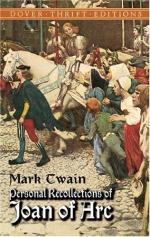“Yes, father.”
“Did you hang them on the tree?”
“No, father.”
“Didn’t hang them there?”
“No.”
“Why didn’t you?”
“I—well, I didn’t wish to.”
“Didn’t wish to?”
“No, father.”
“What did you do with them?”
“I hung them in the church.”
“Why didn’t you want to hang them in the tree?”
“Because it was said that the fairies were of kin to the Fiend, and that it was sinful to show them honor.”
“Did you believe it was wrong to honor them so?”
“Yes. I thought it must be wrong.”
“Then if it was wrong to honor them in that way, and if they were of kin to the Fiend, they could be dangerous company for you and the other children, couldn’t they?”
“I suppose so—yes, I think so.”
He studied a minute, and I judged he was going to spring his trap, and he did. He said:
“Then the matter stands like this. They were banned creatures, of fearful origin; they could be dangerous company for the children. Now give me a rational reason, dear, if you can think of any, why you call it a wrong to drive them into banishment, and why you would have saved them from it. In a word, what loss have you suffered by it?”
How stupid of him to go and throw his case away like that! I could have boxed his ears for vexation if he had been a boy. He was going along all right until he ruined everything by winding up in that foolish and fatal way. What had she lost by it! Was he never going to find out what kind of a child Joan of Arc was? Was he never going to learn that things which merely concerned her own gain or loss she cared nothing about? Could he never get the simple fact into his head that the sure way and the only way to rouse her up and set her on fire was to show her where some other person was going to suffer wrong or hurt or loss? Why, he had gone and set a trap for himself—that was all he had accomplished.
The minute those words were out of his mouth her temper was up, the indignant tears rose in her eyes, and she burst out on him with an energy and passion which astonished him, but didn’t astonish me, for I knew he had fired a mine when he touched off his ill-chosen climax.
“Oh, father, how can you talk like that? Who owns France?”
“God and the King.”
“Not Satan?”
“Satan, my child? This is the footstool of the Most High—Satan owns no handful of its soil.”
“Then who gave those poor creatures their home? God. Who protected them in it all those centuries? God. Who allowed them to dance and play there all those centuries and found no fault with it? God. Who disapproved of God’s approval and put a threat upon them? A man. Who caught them again in harmless sports that God allowed and a man forbade, and carried out that threat, and drove the poor things away from the home the good God gave




